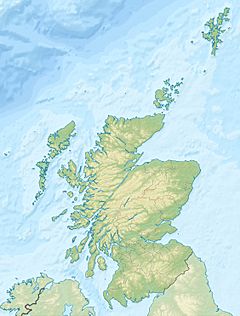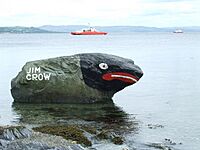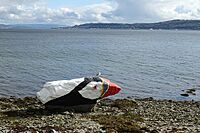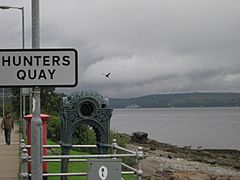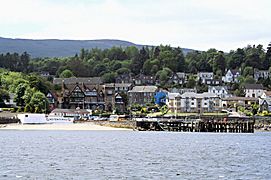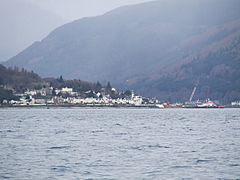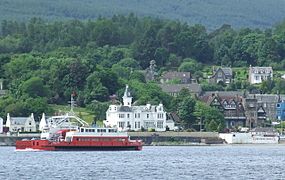Hunters Quay facts for kids
Quick facts for kids Hunters Quay
|
|
|---|---|
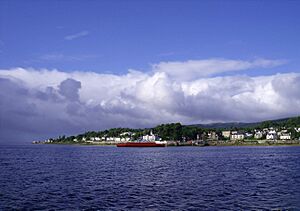 Hunters Quay viewed from the Firth of Clyde, looking southwest |
|
| Population | 5,198 (2013 Est) Including; Kirn, Hunters Quay and Sandbank. |
| OS grid reference | NS 18396 79130 |
| Council area |
|
| Lieutenancy area |
|
| Country | Scotland |
| Sovereign state | United Kingdom |
| Post town | DUNOON, ARGYLL |
| Postcode district | PA23 |
| Dialling code | 01369 |
| EU Parliament | Scotland |
| UK Parliament |
|
| Scottish Parliament |
|
Hunters Quay (which is Camas Rainich in Scottish Gaelic) is a small village. You can find it on the Cowal Peninsula in Argyll and Bute, part of the Scottish Highlands. It sits between the villages of Kirn to the south and Ardnadam to the north. Hunters Quay is well-known as the main base for Western Ferries. These ferries travel across the water between Hunters Quay and McInroy's Point.
Contents
Cool Buildings and Places
The Esplanade
Hunters Quay has a lovely walkway along the shore called the esplanade. It was built way back in 1880. A strong wall protects it from the water. This walkway is along the northern part of Balgay Bay.
Victoria Bridge
The Victoria Bridge crosses over Balgay Bay. It was built in 1878.
Royal Marine Hotel
The current Royal Marine Hotel building was built in 1890. Before that, an older building stood in its place. From 1872 to the 1950s, this hotel was home to the Royal Clyde Yacht Club. This club, which loves sailing, started in 1856.
Hafton House
Hafton House is another important building in Hunters Quay. It was built in 1815 for a person named James Hunter.
Old Villas
In the mid-1800s, Hunters Quay had several large, fancy houses called villas. Some of these included Claver House, Linnwood, Rock Hill, Whinhill, Woodside, and Craigend.
Hunters Quay and the Olympics
Sailing in the 1908 London Olympics
Did you know Hunters Quay played a part in the 1908 London Olympic Games? It hosted a special sailing race! Most of the sailing events for those Olympics happened far away on the Solent. But for the 12-metre class yacht race, only two boats entered. These were Mouchette and Hera.
To make it easier for them, they were allowed to race on the Clyde. The race involved going around a 13-mile (21 km) course on the Clyde twice. It started and finished right at Hunters Quay. The boat named Hera, sailed by Thomas C. Glen-Coats, won the gold medal!
From Jim Crow Rock to Puffin Rock
On the beach at Hunters Quay, there's a unique pointed rock. It's a glacial erratic, which means it was moved there by a glacier long ago. This rock faces the Firth of Clyde. For many years, it was known as "Jim Crow" or "The Jim Crow Stone." By 1904, someone had even painted a face on it!
People had different ideas about where the name came from. Some thought it was linked to the "Jim Crow" character from an old American song and dance. Others believed it was named after a local business owner or even a jackdaw bird. There were also suggestions it related to the later Jim Crow laws in the United States, which enforced racial segregation. Another idea was a poem called The Jackdaw of Rheims.
Over time, people became worried about the name "Jim Crow" because of its links to racism. The rock was painted over several times. However, the old painted face kept reappearing. Then, in 2021, the rock was painted again. This time, it was changed to look like a cute puffin! Now, it's known as Puffin Rock.
Getting Around Hunters Quay
Western Ferries
Hunters Quay is the main home for Western Ferries. The pier used by the ferries has been there since 1973. The port has grown bigger since then. It now has two floating ramps for the ferries. This ferry service connects Hunters Quay to McInroy's Point. McInroy's Point is close to Gourock in Inverclyde. It's on the eastern side of the upper Firth of Clyde.
| Preceding station | Ferry | Following station | ||
|---|---|---|---|---|
| Terminus | Western Ferries Ferry |
McInroy's Point |
Gallery
 | George Robert Carruthers |
 | Patricia Bath |
 | Jan Ernst Matzeliger |
 | Alexander Miles |


